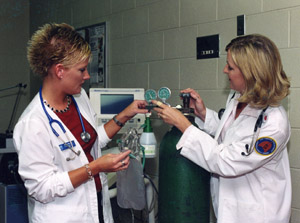The registered respiratory therapist (RRT) applies scientific knowledge and theory to practical clinical problems of respiratory care. The respiratory therapist is qualified to assume primary responsibility for all respiratory care modalities, including the supervision of certified respiratory therapist (CRT) functions. The respiratory therapist may be required to exercise considerable independent clinical judgment, under the supervision of a physician, in the treatment of patients with respiratory dysfunction.

The respiratory therapist performs respiratory care modalities that include oxygen therapy, breathing treatments, humidity-aerosol therapy, pulmonary drainage procedures, mechanical ventilation, and cardiopulmonary resuscitation. Respiratory care practitioners work in acute care hospitals with adults, premature infants and geriatric patients in surgical services, air and ground transport, multi-disciplinary nutrition teams, emergency department, neonatal/pediatric intensive care, and medical, cardiac, and surgical intensive care. Practitioners may choose diverse working environments such as the diagnostic pulmonary laboratory, bronchoscopy laboratory, long-term acute care units, hyperbaric oxygen (HBO) units, or they may choose to work as a traveling therapist, home respiratory therapist, or pharmaceutical sales representative.
The respiratory therapist has a broad scope of practice in the hospital. Daily responsibilities include various respiratory care modalities in the treatment of pulmonary diseases and advanced critical care procedures. The respiratory therapist is also competent in the skillful use of advanced diagnostic tools to accurately diagnose the severity of respiratory dysfunction in neonatal, pediatric, adult, and geriatric patients.
 South Dossett Drive - Closure...
South Dossett Drive - Closure...